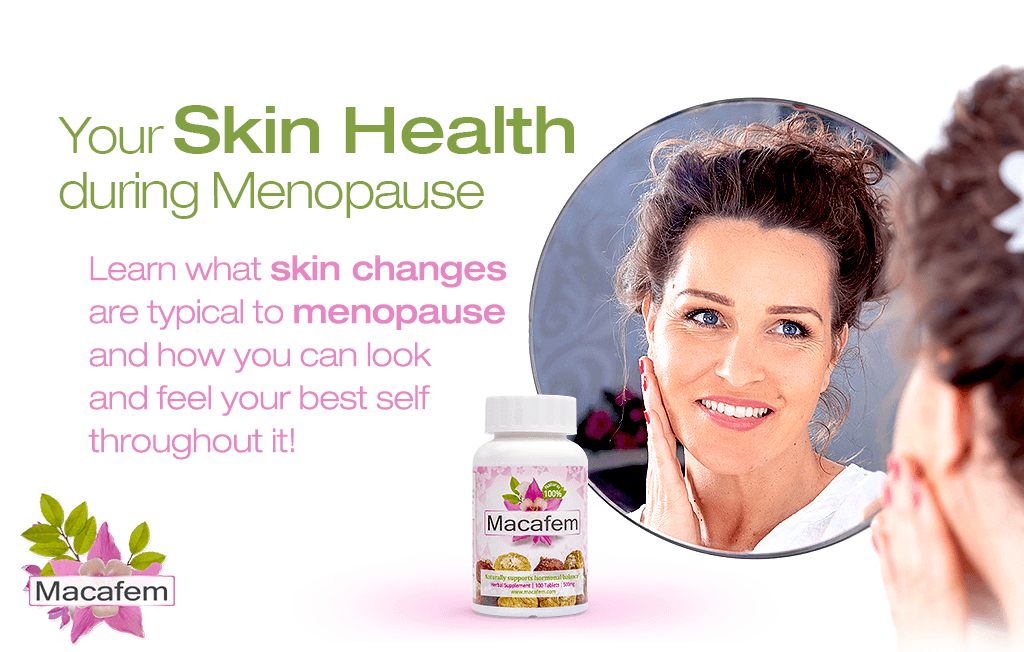Your Skin Health during Menopause
Menopausal shifts affect virtually the entire body, including its largest organ: the skin. In fact, many women become more self-conscious of their face because of the unfamiliar changes they encounter while going through the transition. Keep reading to learn more about your skin health during menopause, including the most common issues, their causes, and best ways to counteract them.

Common Skin Problems during Menopause
Menopausal skin problems don’t affect all middle-aged women the same way. However, certain skin changes on the face are more common than others, including:
- Dryness
- Sagging
- Breakouts/acne
- Dark or brown spots
- Wrinkles
- Jowls
Keep in mind that dermatological problems of menopause don’t only affect facial skin. They may also cause skin problems in other body areas, including psoriasis, eczema, itchiness, and pins and needles. Women could also suffer from hair loss and brittle nails as well as changes of the vaginal tissue.
Why Causes Menopausal Skin Problems
Studies have shown that the main cause of skin problems during the menopausal transition is the decrease of estrogen levels. These massive hormonal shifts are believed to accelerate natural, age-related deterioration of the skin.
With low estrogen levels, the body’s production of collagen drastically decreases, by as much as 30% in the first five years after the menopause date. Collagen is what gives the skin (as well as nails, bones, and hair) strength and elasticity. With less collagen, skin becomes thinner, less elastic, and more wrinkled.
Besides collagen loss, low estrogen also affects water retention and the production of other skin-hydrating compounds, such as hyaluronic acid and glycosaminoglycans. As a result, women may suffer from skin dryness and itchiness.
Tips for Improving Skin Health throughout the Transition
While age-related skin changes cannot be completely prevented, there are a variety of practices that may help lessen their scale and improve its overall health. Consider the following recommendations:
- Diet and hydration. While eating healthy and staying well-hydrated will prevent menopausal skin changes on its own, bad eating habits and poor hydration can certainly worsen the problems.
- Skincare routine. Cleanse your face and moisturize it daily. Skin products with vitamins C and E may help boost collagen and improve skin texture. Acne cleansers with salicylic acid may help wit breakouts.
- Face massage. Regularly massaging your face can offer a multitude of benefits, including increasing blood flow, relieving acne, reducing wrinkles, and improving overall skin appearance.
- UV protection. In order to prevent further damage to the skin, dermatologists recommend using a broad-spectrum sunscreen with SPF 30 (or higher) all year round, not just during the summer.
- Hormonal balance. The best way to lessen the effects of menopause on the body, including your skin, is to promote hormonal balance. Macafem gently stimulates the hormone-producing glands to improve their functions and relieve middle-aged ailments.
Experts agree that skin is one of the most affected organs due to midlife hormonal shifts and age-related changes. But even so, there are a number of ways to take care of your skin health and pass through the transition gracefully and confidently!
Dermato-Endocrinology. (2013). Estrogens and aging skin. Retrieved March 11, 2022 from https://www.ncbi.nlm.nih.gov/pmc/articles/PMC3772914/
Mechanisms of Ageing and Development. (2020). Revisiting the effects of menopause on the skin: Functional changes, clinical studies, in vitro models and therapeutic alternatives. Retrieved March 11, 2022 from https://www.sciencedirect.com/science/article/abs/pii/S0047637419301988
The Australasian Journal of Dermatology. (2001), Menopause and the skin. Retrieved March 11, 2022 from https://pubmed.ncbi.nlm.nih.gov/11488706/

